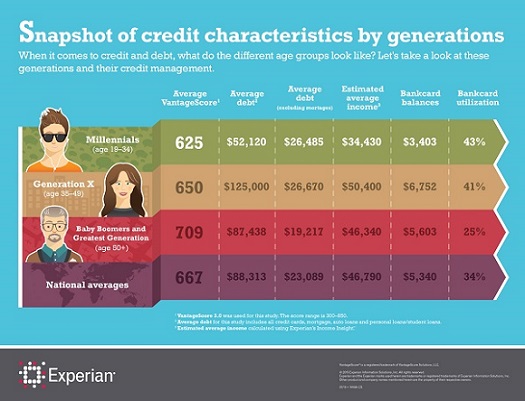Trends
Global trends

 There are many things that can cause angst for consumers during the holiday season including travel delays, overeating, and picking a New Year’s resolution.
One of the biggest stressors is often the financial impact of holiday shopping. In fact, according to a national survey by Experian, many respondents are concerned about the financial stress of gift buying and adding debt, as well as becoming an identity theft victim.
There are many things that can cause angst for consumers during the holiday season including travel delays, overeating, and picking a New Year’s resolution.
One of the biggest stressors is often the financial impact of holiday shopping. In fact, according to a national survey by Experian, many respondents are concerned about the financial stress of gift buying and adding debt, as well as becoming an identity theft victim.

The Millennial generation comprise approximately 80 million people – the largest in history. Thus, it is no surprise that every type or organization from financial to automotive to healthcare are seeking to better understand their mindset and habits. Experian also recently took a look at these post-Baby Boomers to learn more about their approach to personal finance conducting a national survey among more than 1,000 people ages 19-34.

 The appetite and need for data within businesses is continuing to grow at a rapid pace. Organizations are viewing data as a strategic asset and using analytical insights for everything from key business decisions, to the customer experience and more.
However, the methods for managing first-party data and ensuring it’s accuracy have not kept pace with the growing data demand. The majority of businesses today are still relying on siloed, departmental strategies for data management that have little data governance or consistency in terms of people, processes, and technology.
The appetite and need for data within businesses is continuing to grow at a rapid pace. Organizations are viewing data as a strategic asset and using analytical insights for everything from key business decisions, to the customer experience and more.
However, the methods for managing first-party data and ensuring it’s accuracy have not kept pace with the growing data demand. The majority of businesses today are still relying on siloed, departmental strategies for data management that have little data governance or consistency in terms of people, processes, and technology.

 Financing my first car was a bittersweet feeling. I was thrilled at the thought of purchasing a new vehicle, yet I was dreading haggling the price with the dealer. As a millennial, I feared the rising prices for new cars, and knew that I needed to find a way to make the vehicle more affordable. That said, I decided to look at used cars.
Clearly, I’m not the only car shopper going through this experience. Many consumers are exploring new options to keep their monthly payments down, whether it’s extending the length of their loan, or turning to leases. Sometimes it’s both.
Financing my first car was a bittersweet feeling. I was thrilled at the thought of purchasing a new vehicle, yet I was dreading haggling the price with the dealer. As a millennial, I feared the rising prices for new cars, and knew that I needed to find a way to make the vehicle more affordable. That said, I decided to look at used cars.
Clearly, I’m not the only car shopper going through this experience. Many consumers are exploring new options to keep their monthly payments down, whether it’s extending the length of their loan, or turning to leases. Sometimes it’s both.

 Today’s data-driven world creates exciting new opportunities, but also new challenges. Many of us see the promise of being able to make more intelligent decisions by fully understanding our customers and the needs of the marketplace. There are data scientists that can do incredible analysis to give us new insights into areas we didn’t think were possible.
Today’s data-driven world creates exciting new opportunities, but also new challenges. Many of us see the promise of being able to make more intelligent decisions by fully understanding our customers and the needs of the marketplace. There are data scientists that can do incredible analysis to give us new insights into areas we didn’t think were possible.

 Millennials, also known as Generation Y (ages 19-34) are now the largest segment of the U.S. population, and according to a recent Experian analysis, also take the title for being the least credit savvy when compared to previous generations. The study revealed that millennials’ average credit score is 625, and their average debt excluding mortgages is $26,485.
Millennials, also known as Generation Y (ages 19-34) are now the largest segment of the U.S. population, and according to a recent Experian analysis, also take the title for being the least credit savvy when compared to previous generations. The study revealed that millennials’ average credit score is 625, and their average debt excluding mortgages is $26,485.

Addressing the issue of identity management has become a top priority for marketers. The fact is that their customers are represented by dozens of identities – both known and unknown – in today’s digital world. According to new research published in our recently published 2015 Digital Marketer Report, linking identity data is now the #1 challenge for marketers around the world, up from fourth place just a year ago. Further, 89% of marketers report having challenges creating a single customer view.

 If you were to survey American consumers whether or not they would like to be their own boss and successfully run their own business, I would imagine that a good majority would probably say yes. There is something empowering about the thought of setting your own hours and controlling your own destiny, but many people don’t actually take the steps to make that dream a reality.
If you were to survey American consumers whether or not they would like to be their own boss and successfully run their own business, I would imagine that a good majority would probably say yes. There is something empowering about the thought of setting your own hours and controlling your own destiny, but many people don’t actually take the steps to make that dream a reality.

A recent study conducted by Experian showed that a majority of vacationers overspend their budgets and rely on credit cards to provide extra funds. At the extreme end, more than half of millennial vacationers (52 percent) lean heavily on their credit cards, racking up vacation debt they’ll be repaying long after their trip comes to an end.